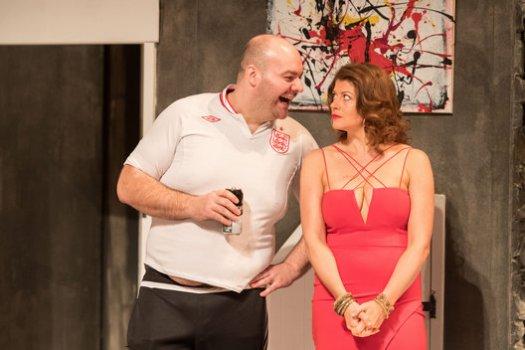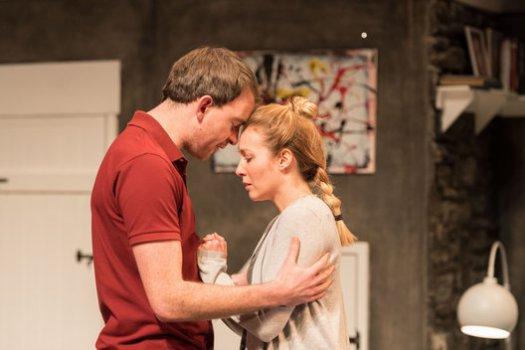Invincible
Bett’s ear for the jargon of his characters and his feel for class distinctions give this play substance and emotional depth.

Graeme Brooks and Elizabeth Boag in a scene from “Invincible” (Photo credit: Manuel Harlan)
[avatar user=”Joel Benjamin” size=”96″ align=”left” ] Joel Benjamin, Critic[/avatar]Invincible by Torben Betts throws together two British couples of different economic and social backgrounds and watches how the different classes mix and match and deal with personal tragedy and marital infidelity.
Oliver (Alastair Whatley) and Emily (Emily Bowker), an educated, upper middle class couple, were forced by financial circumstances to move from liberal, expensive London to a small-minded town in northern England where they hope their financially straitened circumstances would allow for a decent existence for their family.
They argue about political correctness, the care of their children and their lack of financial wherewithal. They are not legally married because marriage is anathema to left-leaning, politically correct Emily (who will live to regret that decision). They are waiting for an inheritance from Oliver’s mother whom Emily despises. Meanwhile Emily obsesses about her children and also about the unfair political/social system that keeps the majority of Britons down (including their neighbors who are seemingly oblivious to such political observations).
Meanwhile they decide to invite these working class neighbors, Dawn (Elizabeth Boag) and Alan (Graeme Brookes) for snacks and conversation. The arrival of sexy Dawn, dressed in an extremely revealing bright red dress, her breasts virtually hanging out, followed later by football-obsessed Alan, his loose midriff jiggling under a t-shirt and sweatpants, immediately puts their situations in relief.

Emily Bowker, Graeme Brooks, Elizabeth Boag and Alastair Whatley in a scene from “Invincible” (Photo credit: Manuel Harlan)
Emily in her plain, homemade jumper and Oliver in his neat shirt and pants don’t drink alcohol, so Dawn and Alan are forced to guzzle their own beer stash from the cans as the conversation starts to flow unsteadily, further revealing the cultural and political gap that separates the couples, even comparing Emily’s Jackson Pollock knockoffs with Alan’s goofy, but heartfelt portraits of his beloved kitty Vince whose fate figures heavily in the plot.
As in all plays that put two couples of disparate means together, the pleasantly social evening progresses to misunderstandings, inadvertent revelations, uncomfortable squabbles and the deaths of relationships and characters.
By Act Two, Invincible morphs from a superficial, silly comedy—complete with the blaring of the theme music from Benny Hill’s lowbrow show—to unalloyed drama with tragedy peeping in from the sidelines. Oliver and Emily have taken to wine after revelations of death and spouse-switching and Dawn has become depressed and homebound after realizing how futile her situation is, followed by tragic news that puts the final nail in her coffin of depression.
Victoria Spearing’s simple home set, wittily spices up with Emily’s pretentious drip paint canvases and educational toy blocks was the perfect setting for revealing the undercurrents among these characters. Spearing also designed the distinctive, character-driven costumes, from Emily’s plain garments to Dawn’s outlandishly revealing dress and, later, her dowdy, dirty sweats which she dons in her deep melancholy.

Alastair Whatley and Emily Bowker in a scene from “Invincible” (Photo credit: Manuel Harlan)
The actors are all splendid giving gutsy, three-dimensional life to characters who might have been clichés in lesser hands. The fact that each character evokes many complex emotional responses is thanks to this brilliant ensemble quartet.
Originally, directed by Christopher Harper, the New York production is manned by Stephen Darcy who is clearly responsible for making these characters and their complex interactions both theatrical and believable.
Betts’ Invincible has been compared to Alan Ayckbourn’s work. Although there are similarities, particularly in Betts’ ear for capturing the jargon of his characters and his feel for social class distinctions, Ayckbourn’s plays are more delicately constructed and make their points—whether social or emotional—more cleverly than Betts. Even so, Invincible—the title a football reference—is satisfying as both a comedy and a drama, breaking more than a few hearts.
Invincible (through July 2, 2017)
2017 Brits Off Broadway Festival
The Original Theatre Company & Ghost Light Theatre Productions
59E59 Theatres, 59 East 59th Street, in Manhattan
For tickets, call 212-279-4200 or visit http://www.59E59.org
Running time: two hours including one intermission






Leave a comment